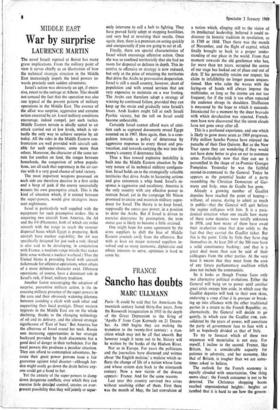War by surprise
MIDDLE EAST LAURENCE MARTIN
The novel Israeli reprisal at Beirut has many grave implications. From the military point of view it serves chiefly as an illustration of how the technical strategic situation in the Middle East increasingly impels the local powers to- wards precisely such sudden adventures.
Israel's action was obviously an apt, if exces- sive, retort to the outrage at Athens. This should not conceal the fact that the operation was also one typical of the present pattern of military operations in the Middle East. The essence of the affair was surprise, aggressive and extreme action executed by air. Local military conditions encourage, indeed compel, just such tactics. Middle Eastern terrain is ideally suited to air attack carried out at low levels, which is vir- tually the only way to achieve surprise by air today. All the sides in the Middle Eastern con- frontation are well provided with aircraft suit- able for such operations; some more than others. Moreover, the character of the same ter- rain for combat on land, the ranges between homelands, the congestion of urban popula- tions, are all such that supremacy in the air car- ries with it a very good chance of total victory.
The most important weapons possessed on each side are therefore decisive in a first strike and a heap of junk if the enemy successfully mounts his own preemptive attack. This is the kind of situation which, if it existed between the super-powers, would give strategists inces- sant nightmares.
Israel is particularly well supplied with the equipment for such preemptive strikes. She is acquiring two aircraft from America, the A4 and the F4 (Phantom), both of which are strike aircraft with the range to reach the remoter dispersal bases which Egypt is preparing. Both aircraft have nuclear capability; the A4 was specifically designed for just such a role. (Israel is also said to be developing, in conjunction with France, a medium-range missile that makes little sense without a nuclear warhead.) Thus the United States is providing Israel with aircraft tailormade for offensive operations, when others of a more defensive character exist. Offensive operations, of course, have a dominant role in Israel's rich, if brief, military tradition.
Another factor encouraging the adoption of surprise, preventive military action, is the in- creasing military presence of the super-powers in the area and their obviously widening dilemma between avoiding a clash with each other and supporting their local protégés. Direct western interests in the Middle East are on the whole declining, thanks to the changing technology of oil and its delivery, and the altered strategic significance of 'East of Suez.' But America has the albatross of Israel round her neck. Russia sees increasing opportunities in her strategic backyard provided by Arab discontents but a good deal of danger in their turbulence. For the local powers this produces a peculiar situation. They can afford to contemplate adventures, be- cause their great power patrons issue a fair guarantee against total disaster—although Jor- dan might easily go down the drain before any- one could get a hand to her.
Yet the anxiety of the super-powers to damp down dangerous conflicts, over which they can exercise little detailed control, creates an ever- present possibility that they will jointly or separ-
ately intervene to call a halt to fighting. They have proved fairly adept at stopping hostilities, and very bad at reversing their results. Once again, then, there is a premium on acting quickly and unexpectedly if you are going to act at all.
Finally, there are special characteristics of Israel which encourage offensive action. Once she was so confined territorially that she had no room for dispersal or defence in depth. This in- centive to offensive or strategy is now reduced, but only at the price of retaining the territories that drive the Arabs to provocative desperation. Israel is still a small country, however, short of population and with armed services that are very expensive to maintain on a war footing. The Arabs can therefore adopt a strategy of winning by continued failure, provided they can keep up the strain and gradually raise Israeli's losses. Arab leaders might fall at each Israeli Pyrrhic victory, but the toll on Israel could become unbearable.
Certainly Israel cannot afford wars of attri- tion such as captured documents reveal Egypt counted on in 1967. Here again, then, is a com- pulsion towards a policy of deterrence by aggressive responses to every threat and pro- vocation, and towards carrying the war into the enemy's country if deterrence fails.
Thus a bias toward explosive instability is built into the Middle Eastern situation by the very nature of its technical military configura- tion. Israel holds on to the strategically valuable territories that drive Arabs to harassing actions and give extremists a whip hand. Israel's re- sponse is aggressive and escalatory. America is the only country with any effective power to restrain Israel, yet in the campaign Mr Nixon promised to create and maintain military supre- macy for Israel. The theory is to keep Israel, supposedly the status quo power, in a position to deter the Arabs. But if Israel is driven to exercise deterrence by preemption, the term status quo is likely to become a little strained.
One might hope for some agreement by the arms suppliers to shift the bias of Middle Eastern arsenals away from the offensive. But with at least six major national suppliers in- volved and so many economic, diplomatic and ethnic interests to serve, optimism is hard to come by.


































 Previous page
Previous page